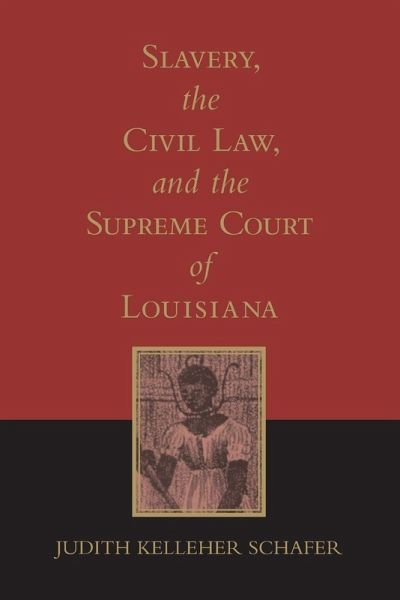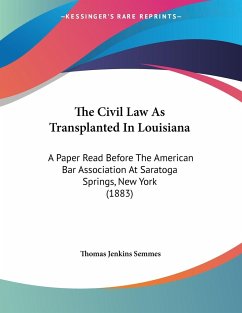
Slavery, the Civil Law, and the Supreme Court of Louisiana (Revised)
Versandkostenfrei!
Versandfertig in 1-2 Wochen
41,99 €
inkl. MwSt.

PAYBACK Punkte
21 °P sammeln!
Constituting what may be the most impressive research to date of state supreme court records, Slavery, the Civil Law, and the Supreme Court of Louisiana analyzes the evolution of Louisiana's slave laws from the territorial period to the Civil War. Over the course of four years, Judith Kelleher Schafer examined the original handwritten decisions (only recently made available) of the Louisiana Supreme Court, scrutinizing 1,200 appeals involving slaves as plaintiffs, defendants, or objects in lawsuits or criminal actions. The result is the first book-length study of those manuscripts and the firs...
Constituting what may be the most impressive research to date of state supreme court records, Slavery, the Civil Law, and the Supreme Court of Louisiana analyzes the evolution of Louisiana's slave laws from the territorial period to the Civil War. Over the course of four years, Judith Kelleher Schafer examined the original handwritten decisions (only recently made available) of the Louisiana Supreme Court, scrutinizing 1,200 appeals involving slaves as plaintiffs, defendants, or objects in lawsuits or criminal actions. The result is the first book-length study of those manuscripts and the first study of any state's slave law and its courts to use original case records from the entire antebellum era. Louisiana's legal system was unique among those of southern slave states in that it embodied a legacy of French, Spanish, and thus, indirectly, Roman law. However, through repeated exposure to common-law tenets over time - a development Schafer tracesLouisiana law became more "Americanized, " so that by the dawn of the Civil War it was in many respects very similar to that of other states seceding from the Union. Louisiana was unusual also in that its highest court was required to hear virtually every case brought to it on appeal. Decisions of that body, therefore, represent not merely a few landmark cases but a spectrum of typical parish- and district-court cases, many of which include vivid details about the day-to-day realities of slavery and the world that formed, and was formed by, that institution. Schafer presents numerous concise case histories, stories that are fascinating and at times heartbreaking in the particulars they reveal about slaves' existence. We see how the courtcontinually wrestled with the paradox that slaves were considered by the law to be at once persons and property. Property considerations usually won out: even cases involving the abuse or killing of slaves often came before the court as civil matters rather than criminal. Slavery, the Ci














